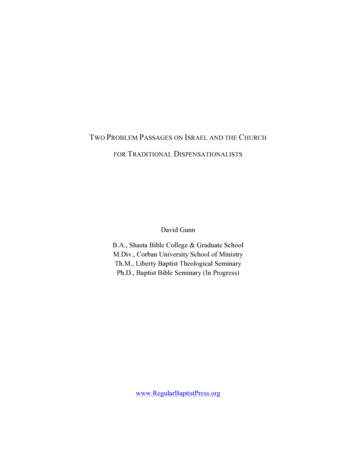
Transcription
TWO PROBLEM PASSAGES ON ISRAEL AND THE CHURCHFOR TRADITIONAL DISPENSATIONALISTSDavid GunnB.A., Shasta Bible College & Graduate SchoolM.Div., Corban University School of MinistryTh.M., Liberty Baptist Theological SeminaryPh.D., Baptist Bible Seminary (In Progress)www.RegularBaptistPress.org
When I was ministering as an associate pastor in a Baptist church in Washington, I was blessedwith the opportunity to take my adult Sunday School class through a year-long study of biblicaleschatology. It was a time of significant growth both for the class and for me personally, and Iwill always remember it fondly. But I will also always remember the unique challenge posed byone of my students, Ron. Ron was a committed post-millennialist, partial preterist, andsupercessionist. (He was also on the elder board, so I had to be polite.) Needless to say, he foundplenty to disagree with in a class on eschatology taught by a premillennial dispensationalist!Often, after everyone else had filtered out of the classroom, Ron would seek me out and pose afriendly challenge or objection to my teaching for the week. As the year wore on, I couldn’t helpnoticing how frequently Ron’s challenges and objections would inexorably involve an appealeither to Romans 9:6 or Galatians 6:16. In the years since, I have read and heard countless othersupercessionists make identical appeals to these same passages, and they always make me thinkfondly of my conversations—always friendly but often exasperating—with Ron.This paper will take a long, hard look at these two passages. They are not the only prooftextsemployed by supercessionists, but they seem to be the two most commonly cited. I will surveythe principal interpretive approaches to each passage, consider the major factors affecting thedetermination of which interpretive approach is most exegetically warranted, and try to come togrips with the question, “Do these passages on Israel and the Church pose a problem fortraditional dispensationalists?”Romans 9:6Ο χ ο ον δτι κπέπτωκενσρα λ ο τοι σραήλ·λόγος τοθεο . ογ ρ πάντες οξAt one time, Romans 9:6 was a favorite prooftext for supercessionists. When ArnoldFruchtenbaum wrote his doctoral dissertation on Israelology in 1989, he was able to claim, “Themajority [of Covenant Theologians] understand this verse to be speaking of the Church.”1 Today,however, the situation has changed insofar as the scholarly world is concerned. Theoverwhelming majority of commentators—including our covenentalist brethren—have nowmoved away from the supercessionist interpretation of Romans 9:6.2 Nevertheless, the verse’s1Arnold G. Fruchtenbuam, “Israelology: The Missing Link in Systematic Theology,” PhD Dissertation (New York:New York University, 1989), 322.2Oftentimes this move is made with a wistful glance behind: note the number of commentators who, in the processof disclaiming the supercessionist interpretation of this passage, hastily add that of course they still hold a basicallysupercessionist theology on the basis of other passages—usually Galatians 6:16 [E.g. Douglas J. Moo, The Epistle tothe Romans, The New International Commentary on the New Testament (Grand Rapids, MI: Eerdmans, 1996), 574;Grant R. Osborne, Romans, The IVP New Testament Commentary Series (Downers Grove, IL: IVP, 2004), 242;John Murray, The Epistle to the Romans (Grand Rapids, MI: Eerdmans, 1959), 2:9-11; Thomas R. Schreiner,Romans, Baker Exegetical Commentary on the New Testament (Grand Rapids, MI: Baker Academic, 1998), 493;1
inclusion in this paper is warranted on the grounds that popular-level writers still frequentlyappeal to it in support of their view that the Church is the “true Israel.”3 Thus, the task ofexamining and understanding the reasoning underlying the classic supercessionist approach tothis verse remains altogether valid.Description of the Interpretive ViewsThere are basically two interpretive approaches to Romans 9:6: the supercessionist view and theremnant view. Vlach provides a succinct description of the supercessionist view: “Some see inthe mention of ‘Israel’ a concept of Israel that goes beyond ethnic boundaries. Thus, Paul isallegedly making a distinction between ethnic Israel4 and a spiritual Israel that consists of allbelievers including Gentiles.”5It is granted that not all who hold this view would embrace the term supercessionist; some haveinsisted that their understanding entails not so much a replacement of Israel by the Church, as anenlargement of Israel into the Church!6 (Ice and Vlach refer to these as neo-supercessionists.)7While I recognize the theoretical validity of the distinction, their views do not seem to besubstantially distinguishable from classic supercessionism, so the term supercessionist view willbe used here to encompass both camps. The defining characteristic of this approach to thispassage really has little to do with the question of whether Israel is replaced or enlarged; it is,Gordon R. Lewis and Bruce A. Demarest, Integrative Theology (Grand Rapids, MI: Zondervan, 1996), 3:332-333;etc.].3E.g. Russell Moore, “Is There a ‘Genuine Offer’ of the Kingdom?” enuine-offer-of-the-kingdom/ [Accessed July, 2015]; Hank Hanegraaff, The Apocalypse Code (Nashville,TN: 2007), 50; Bruce Tucker, The Posttribulational Rapture of the Church (Bloomington, IN: Xlibris, 2001), 82;Brian Warner, “Replacement Theology,” http://replacementtheology.org/ [Accessed July, 2015].The situation is somewhat comparable to the current status of the Graf-Wellhausen documentary hypothesis onPentateuchal origins. While the hypothesis is widely recognized by scholars as having been mortally wounded agesago, it is kept on perpetual life support via popular avenues of communication, such as History Channel specials andpoorly-researched polemical books by the new atheists.4“Empirical Israel” is another term sometimes employed as an alternative to “ethnic Israel.” Curiously, “nationalIsrael” is almost never used in discussions on this passage.5Michael J. Vlach, Has the Church Replaced Israel? (Nashville, TN: B&H Academic, 2010), 128.6Samuel E. Waldron, MacArthur’s Millennial Manifesto: A Friendly Response (Owensboro, KY: ReformedAcademic Press, 2008), 7; Hank Hanegraaff, “Response to National Liberty Journal Article on The ApocalypseCode,” 988-4091-84BDF8E70A3B0215%7D/PSN001.PDF [Accessed July, 2015].7Thomas Ice, “Neo-Replacement Theology,” paper presented to the Pre-Trib Study Group, Theolo.pdf [Accessed July, 2015]; Michael Vlach, “An Analysis of NeoReplacement Theology,” paper presented to the Pre-Trib Study Group, epla1.pdf [Accessed July 2015].2
rather, that the first occurrence of σραήλ in this verse denotes ethnic Israel while thesecond occurrence denotes a broader company including both Jews and Gentiles.8The remnant view is aptly described by Johnson:The statement “for not all who are descended from Israel are Israel” has nothing to dowith Gentiles, although some have tried to make it include them. What it says, plainlyand simply, is that there are two kinds of Israelites. Just because a person is ethnically anIsraelite does not mean that he or she is an Israelite in the truest sense, for the term is areligious one. To be a true Israelite, one must be a believer, walking in the steps of fatherAbraham (cf. 4:12). It is to the believing seed of Abraham that the promises are given.Paul discusses a division within the nation of Israel, not Gentiles.9Note that this is not an overtly dispensational interpretive approach; as mentioned previously,many supercessionists have adopted it quite comfortably. However, of the two approaches it isfar more conducive to dispensationalism, so it is no great surprise to find that it has been andremains the position of virtually all dispensational commentators.10A handy aid for visualizing these interpretive approaches is provided by the NIV ZondervanStudy Bible:118Unfortunately, while it is relatively easy to define the supercessionist view of Romans 9:6, it is an altogethertrickier matter to understand the major arguments in its favor. This is because many of the view’s advocates preferto establish it by assertion rather than argumentation [E.g. Martin Luther, Commentary on the Epistle to the Romans,translated by J. Theodore Mueller (Grand Rapids, MI: Zondervan, 1954), 122; Erickson, Christian Theology, 3rd ed.(Grand Rapids, MI: Baker Academic, 2013), 959; A Basic Guide to Eschatology (Grand Rapids, MI: Baker Books,1998), 123-124; H. Ridderbos, Paul: An Outline of His Theology, translated by J. R. De Witt (Grand Rapids, MI:Eerdmans, 1975), 336 n. 30; Dinkler, “The Historical and the Eschatological Israel in Romans Chapters 9-11,”Journal of Religion 36:2 (Apr 1956): 116; Ellis, 137.]9S. Lewis Johnson, Discovering Romans, edited by Mike Abendroth (Grand Rapids, MI: Zondervan, 2014), 152.10Another exceptionally succinct and clear statement of the remnant view is Walvoord’s [The Millennial Kingdom(Grand Rapids, MI: Dunham, 1959), 168-169], but it is much more overtly dispensational than Johnson’s.11D. A. Carson, ed., NIV Zondervan Study Bible (Grand Rapids, MI: Zondervan, 2015), 2309.3
Major FactorsHere we will consider the major factors upon which one’s interpretation of Romans 9:6 will turn.These include the distinction between Israel and Israel, syntactical issues, contextual issues, andPaul’s application of “Israel” terminology to the Church.The Distinction between Israel and IsraelAs traditional dispensationalists, we are committed to the programmatic distinction betweenIsrael and the Church. The Apostle Paul went one step further: he distinguished between Israeland Israel! (To avoid question-begging, I will refer to them as σραήλ1 and σραήλ2herein.)This is a minor point, but it needs to be made. In some cases, proponents of the supercessionistview have cited the fact of this distinction as a point in their favor, as though Paul’s establishingthe distinction implies anything definite about the nature of that distinction.12 This is anillegitimate tactic. Both sides of the debate agree that a distinction is made; the real disagreement12E.g. “Paul actually began the whole section (9:6) with just such a programmatic distinction of two ‘Israels’, andthroughout the letter (e.g. 2.25-9) as well as elsewhere (Philippians 3.2-11) he has systematically transferred theprivileges and attributes of ‘Israel’ to the Messiah and his people” [N. T. Wright, The Climax of the Covenant, 250];“When Paul says in Romans 9:6 that ‘they are not all Israel that are Israel,’ he is using the term Israel with twodifferent meanings in a single verse” [O. Palmer Robertson, The Israel of God: Yesterday, Today, and Tomorrow(Phillipsburg, NJ: P&R, 2000), 188].4
is over the distinction’s extent. If σραήλ1 and σραήλ2 are fundamentally disparate butoverlapping categories, then the distinction is severe. If the latter is a subcategory of the former,then it is less so.On that note, it bears mentioning that the language used to describe this distinction (byproponents of both views) tends to improperly absolutize the distinction. Observe: Grudem: “Those who are in the most true sense ‘Israel,’ are not the nation of Israel byphysical descent from Abraham but those who have believed in Christ.”13Hodge: “God was at liberty to reject the Jews and to call the Gentiles, Paul argues, 1. Byshowing that the promises which he had made, and by which he had graciously boundhimself, were not made to the natural descendants of Abraham as such, but to his spiritualseed.”14Barnhouse: “At once we see, therefore, that the selection is tied to the promises of Godand not to the fleshly line of Isaac.”15Barrett: “But Israel is not a term like Ammon, Moab, Greece, or Rome. ‘Israel’ cannot bedefined in terms of physical descent, or understood simply ‘on the human side’ (v. 5); itis created not by blood and soil, but by the promise of God, and therefore exists withinthe limits of God’s freedom.”16Byrne: “The focus remains upon God and the indications given in scripture that“promise” and “calling,” rather than ethnic belonging, mark the pattern of divineaction.”17Dewelt, MacKnight, and Lard: “Now God had made certain promises to those of Israeljust as he had to those of Abraham. But did he mean all those who were of the flesh ofIsrael or, of the spirit of Israel?”18Mounce: “Spiritual kinship, not ethnic origin, determined who was a true Israelite.”19Additional examples could be multiplied. This kind of language creates a false dichotomybetween ethnic identity and spiritual identity, as though σραήλ1 is circumscribed only by the13Wayne A. Grudem, Systematic Theology (Grand Rapids, MI: Zondervan, 1994), 861.14Charles Hodge, A Commentary on Romans (London: Banner of Truth Trust, 1972), 303.15Donald Grey Barnhouse, Exposition of Bible Doctrines (Grand Rapids, MI: Eerdmans, 1954-62), 4:26.16C. K. Barrett, A Commentary on the Epistle to the Romans (New York: Harper & Row, 1817), 180.17Brendan Byrne, Romans, Sacra Pagina (Collegeville, MN: Liturgical Press, 1996), 292.18Don Dewelt, James MacKnight, and Moses E. Lard, Romans Realized, Bible Study Textbook (Joplin, MO:College Press, 1959), 144.19Robert H. Mounce, Romans, The New American Commentary (Nashville: Broadman & Holman, 1995), 198.5
former, σραήλ2 only by the latter.20 By contrast, the remnant view operates according to thelogic that ethnic identity circumscribes σραήλ1, while both ethnic and spiritual identitycircumscribes σραήλ1. This tendency is therefore detrimental to the remnant view, but as weshall see it has little textual basis.Syntactical IssuesThe only syntactical issue pertaining directly to this discussion is the relationship between thenegative particle ο and the two halves of Romans 9:6b. That is, did Paul intend ο to modifyπάντες οξ σρα λ or ο τοι σραήλ? The overwhelmingly majority ofcommentators and translators have favored the former option (usually without articulating theirreasons for doing so), but John Piper makes a case for the latter:For two reasons I have construed the ο to modify the clause ο τοι σραήλ ratherthan πάντες. In the first place the demonstrative ο τοι refers to a definite group ofpeople, but the negation ο πάντες is very indefinite. It does not work to say, “Not allthe ones from Israel, these are Israel.” In the second place Rom 7:15, a very close parallelto the grammatical structure of Rom 9:6b, has ο in the same anterior position as herebut there it definitely modifies the second clause.21Piper’s reasoning seems sound. He is joined in this opinion by Dunn, Moo, and Schreiner.22 Asfar as I can tell, no one has mounted a vigorous defense of the other option on grammaticalgrounds. Jewett has opposed Piper’s contention on contextual grounds:[A] strict construal of this reading would be to extend Paul’s claim too widely byimplying that none of those descended from Israel belong to the true Israel. . . . If from“all those who are from Israel,” none are truly Israel, then the distinction that Piperwishes to maintain in Justification, 48-52, between the Israel according to the flesh andthe true Israel is undermined.23Jewett’s concern is valid, but he may be pressing the point too far. Paul could simply beemphasizing that the totality of σραήλ1 is not identical to σραήλ2, without thereby implyingthat none of the constituents of σραήλ1 is contained in (or overlaps with) σραήλ2. Either20Later, we will observe a similar absolutizing tendency with respect to the language of election in this passage.21John Piper, The Justification of God (Grand Rapids, MI: Baker Book House, 1983), 47. Emphasis in the original.22James D. G. Dunn, Romans 9-16, Word Biblical Commentary (Dallas, TX: Word Books, 1988), 539; DouglasMoo, The Epistle to the Romans, 573; Thomas Schreiner, Romans, 493.23Robert Jewett, Romans, Hermeneia, edited by Eldon Jay Epp (Minneapolis, MN: Fortress Press, 2007), 574.Italics in the original.6
option seems a valid interpretation of Piper’s reading, but of course the latter is untenable since itwould disqualify Paul himself from inclusion in σραήλ2!If we accept Piper’s proposal, the result is that the case for the supercessionist interpretiveapproach is strengthened—though only slightly.24 Arguably, grouping ο with σραήλ1 ismore conducive to a restrictive understanding (the remnant view), whereas grouping it withσραήλ2 at least opens the door to a more expansive understanding (the supercessionist view).25But it would not impel anyone to the supercessionist view, since the restrictive sense is viable onboth readings. Hence, Schreiner’s caveat that “the meaning of the sentence is not affectedsignificantly on either reading.”26Contextual IssuesI understand the foregoing material in Romans to flow as follows:I. Introduction to the epistle’s theme, the Gospel, 1:1-17II. Justification: The Gospel’s application accomplished, 1:18-5:21A. The universal necessity of justification, 1:18-3:31B. The universal availability of justification, 3:21-4:25C. Some principal benefits of justification, 5:1-11D. Transition: a theological and historical reflection, 5:12-21III. Sanctification: The Gospel’s abiding effects, 6:1-8:17A. The necessity of sanctification, 6:1-23B. The means by which sanctification is accomplished, 7:1-:8:17IV. Glorification: The Gospel’s ultimate objective envisioned, 8:18-30A. The necessity of glorification, 8:18-23B. The inevitability of glorification, 8:24-39Having thus sketched out all that is involved in the salvation transaction—justification (past),sanctification (present), and glorification (future)—Paul concluded on a note of triumph. Allthose whom God has foreknown He will also elect, call, justify, and glorify (8:29-30). And,consequently, none of God’s elect can ever be separated from “the love of God in Christ Jesusour Lord” (8:31-39). This sounds wonderful, of course, but the thoughtful reader willimmediately notice an apparent anomaly in the history of God’s dealing with man: What about24Piper himself adopts the remnant view, but Dewelt, MacKnight and Lard seem to base their supercessionistinterpretation partly on this very syntactical decision [Romans Realized, 141].25Consider the difference between “Not all players on the Chicago White Sox are the greatest baseball players in theworld” and “All those players on the Chicago White Sox, they’re not the greatest baseball players in the world.” Theformer is more restrictive (the speaker is about to select just a few of the White Sox players to extol) while the latteris more expansive (the speaker is going to look outside the White Sox organization for players to extol).26Thomas Schreiner, Romans, 493.7
Israel? Wasn’t she an elect nation? Yet she turned from God and crucified the Lord of Glory.Perhaps God’s election isn’t quite so secure and inviolable after all. If this objection is permittedto stand, one can see how devastating it might prove to Paul’s argument.In classic Pauline fashion, the apostle anticipates the objection and confronts it headlong,embracing upfront the fact of Israel’s fallenness (9:1-3). He will devote three chapters of hisepistle (9-11) to explaining how her fall from grace does not obviate his exposition of theGospel.27Paul affirms that Israel is indeed an elect nation and enumerates her resultant privileges (9:4-5),28but is quick to point out that although these benefits presumably accrue to every singleIsraelite ( σραήλ1), salvation does not. That is a privilege accorded only to σραήλ2. Clearly,the logic of this assertion will be understood differently depending on whether one adopts thesupercessionist or the remnant view. Granted the former, Paul would be saying, “Yes, Israel wasa divinely chosen nation with many significant privileges, but that doesn’t mean all Israelites aresaved. Salvation is a matter of faith, not ethnicity. The real company of the saved is the Church,Jews and Gentiles alike united in one body by grace through faith.” Granted the latter, Paulwould be saying, “The many privileges that accrued to Israel by virtue of her status as an electnation do not include salvation. Only a small portion of those who belong to the elect nation arealso themselves elect individuals, saved by the Gospel of Jesus Christ.”The flow of vv. 1-6 suggests that the content of v. 6 is offered as a factor that mitigates thesorrow Paul expressed in vv. 1-2. Observe:1 λήθειαν λέγω ν Χριστ , ο ψεύδοµαι, συµµαρτυρούσης µοιτ ς συνειδήσεώς µου ν πνεύµατι γί ,2τι [indirect discourse: αλήθειαν λέγω, v. 1] λύπη µοίστιν µεγάλη καδιάλειπτος δύνη τ καρδί µου.3 η χόµην γ ρ [explanatory: gives the reason forPaul’s sorrow, vv. 1-2] νάθεµα ε ναι α τ ς γπτο Χριστοπ ρ τ ν δελφ ν µου τ ν συγγεν ν µου κατσάρκα,4 ο τινές [antecedent: τ ν δελφ ν µου τ νσυγγεν ν µου κατ σάρκα] ε σιν σραηλ ται,ν27Just as his preceding discussion progressed roughly in a chronologically linear fashion (past, 1:18-5:21; present,6:1-8:17; future, 8:18-39), I think it is helpful to view his treatment of Israel as roughly chronological (past, ch. 9;present, ch. 10; future, ch. 11). Granted, these divisions are not entirely airtight, but I think they do accuratelydescribe the general shape of Paul’s thought here.28This is a discussion he actually began back in 3:1 when establishing the total damnability of Jew and gentile alike,but he digressed from the topic until 9:1. [George Gunn, “Romans 11:17, Israel, the Church & the Olive Tree,”paper presented to the Council on Dispensational Hermeneutics, 2014, 2-3.]8
υ οθεσία καδόξα κα α διαθ και κανοµοθεσία καλατρεία κα απαγγελίαι, 5 νο πατέρες καξ νΧριστ ς τ κατ σάρκα,ν π πάντων θε ς ε λογητ ς ε ς το ς α νας,µήν.6 Ο χ ο ον δvv. 1-2] τι[adversative: contrasts with Paul’s sorrow,κπέπτωκενλόγος το θεο .Verses 1-2 state Paul’s sorrow, v. 3 supplies the reason for Paul’s sorrow, and vv. 4-5 expand onthe significance of Paul’s kinsmen. Most likely, then, v. 6 stands in a mildly adversativerelationship to vv. 1-2.29 In other words, Paul is saying, “I am very sorrowful because of thefallenness of the Jews, but my sorrow is mitigated because I know that not all of them will belost.” (If this interpretation of the syntactical relationships is correct, it will significantlystrengthen the remnant view.30 The supercessionist understanding of the passage would not bringany relief to Paul’s sorrow over his fellow Israelites fallenness; if anything, it would heighten it!)It is important to note that, according to Paul, it was always the case that not all individualIsraelites were saved simply by virtue of their inclusion in the covenant nation. As early as 2:2829 Paul distinguished between superficial Jewishness (which is merely external) and trueJewishness (which is both external and internal).31 This distinction was alluded to again in4:12,32 where Paul posited Abraham as the “father of all who believe without being circumcised”as well as “of the circumcised who are not merely circumcised but who also walk in the footstepsof the faith that our father Abraham had before he was circumcised.” Now the existence of the29I am indebted to George Gunn for first pointing this out to me. Cranfield [A Critical and Exegetical Commentaryon the Epistle to the Romans, The International Critical Commentary (Edinburgh: T & T Clark, 1979), 2:472],Sanday and Headlam [A Critical and Exegetical Commentary on the Epistle to the Romans, The InternationalCritical Commentary (New York: Charles Scribner’s Sons, 1940), 240], and Jamieson, Faucett, and Brown [ACommentary, Critical, Experimental, and Practical, on the Old and New Testaments (Glasgow, Scot.: WilliamCollins, Sons, & Co., 1874), 250] also come close to articulating it.30Cranfield’s explanation here is helpful: “But, if God’s purpose of election has, from the very beginning, includeda process of distinguishing and separating even within the elect people, then the present unbelief of many Jews is noproof that that purpose has failed, but may be understood rather as part of its working out” [Epistle to the Romans,2:474].31John A. Witmer, “Romans” in the Bible Knowledge Commentary, New Testament, edited by John F. Walvoordand Roy B. Zuck, 435-503 (Wheaton, IL: Victor Books, 1985): 476. Some supercessionists [e.g. Charles Hodge,Systematic Theology (Oak Harbor, WA: Logos Research Systems, 1997), 1:133] see the Church as the true Israel inthis passage, too. But this is unlikely, since “Paul concluded his discussion of the Gentiles in Romans 2:16. In Rom2:17-30 he considers the Jewish question” [Fruchtenbaum, “Israel and the Church,” in Issues in Dispensationalism,ed. W. R. Willis and J. R. Masters (Chicago: Moody Press, 1994), 128].32Adolf Schlatter, Romans: The Righteousness of God, translated by Siegfried S. Schatzmann (Peabody, MA:Hendrickson, 1995), 204.9
second category (ethnic Jews who have faith in God) implies the existence of a third (ethnic Jewswho do not have faith in God).Faithful GentilesSons of AbrahamFaithful JewsNot sons of AbrahamUnfaithful JewsHaving stated the principle of distinction between σραήλ1 and σραήλ2, Paul now proceedsto illustrate the selectivity of God’s election from Israel’s history. The patriarchal history isrehearsed, with the emphasis placed on God’s selective narrowing of the promised line fromAbraham to Isaac (Ishmael is excluded, vv. 7-9) to Jacob (Esau is excluded, vv. 10-13).33 In eachcase, the election of one individual to father the chosen line is based entirely on the sovereignchoice of God, not on any consideration of the individual’s merits. This point is made especiallyclear by the rejection of Esau and election of Jacob, for that decision was made while the twinswere still in utero!34The principle is clear: it is God’s sovereign choice that results in salvation. Mere inclusion in thecovenant nation by virtue of being born to Jewish parents, while certainly advantageous in somerespects, is insufficient in and of itself to secure right standing with God. But while Paul’s logicis readily understandable, we might quibble over how he is applying it to the distinction betweenσραήλ1 and σραήλ2. The supercessionist will place all of the emphasis on God’ssovereignty in choosing while effectively ignoring the narrowing pattern within the Abrahamicfamily tree. Thus, there is a tendency (once again) to create a false dichotomy: Dodd: “It follows that the status of the Jew rests upon nothing but a free determination ofthe divine will.”35Fitzmyer: “The Old Testament promises were not made to the ethnic or historicalempirical Israel, those of physical descent or of flesh and blood, but to the Israel of faith.If God were bound by physical descent, his promises would not have been freely made.They were made instead to the Israel that would come to faith.”36Sproul: “God’s promise is given sovereignly, not biologically.”3733Although Paul does not discuss it, I believe this is simply the continuation of a narrowing process that had begunmuch earlier, immediately following the seed promise of Genesis 3:15. The line of the promised seed was narrowedfirst to Seth (Gen. 4:25), then to Noah (9:9), and finally to Abraham (12:7, 13:15-16, 15:5ff.), Isaac (17:19), andJacob (28:4, 13).34Robert Mounce, Romans, 198-199.35C. H. Dodd, The Epistle of Paul to the Romans (New York: Harper and Brothers, 1932), 156.36Joseph A. Fitzmyer, Romans: A New Translation with Introduction and Commentary, The Anchor Bible (NewYork: Doubleday, 1993), 559-560.37R. C. Sproul, The Gospel of God (Fearn, Ross-shire: Christian Focus, 2005), 164.10
By contrast, the advocate of the remnant view will incorporate both the sovereignty of God’selecting choice and the narrowing pattern within the Abrahamic family tree, in his understandingof how Paul intends this historical illustration to function. Munck captures this sentimentperfectly:Even though [Paul] maintains in this passage that God in his sovereign will chooseswhom he wishes, one must not fail to add: whom he wishes from Israel. Paul does nothere visualize “Israelites” who do not belong to physical Israel as being within the newIsrael of the church. It is not until 9:22ff. that Paul includes the Gentile Christians in hisreflections. Here in 9:6-13 the only point he makes is that claims cannot be made on thebasis of physical descent, since descendants of the patriarchs with exactly the sameclaims were allotted different destinies.38Finally, in considering the surrounding context of Romans 9:6, we must note Paul’s citation oftwo Old Testament passages emphasizing the concept of a righteous remnant within the broadercategory of national Israel. Isaiah 10:20 (quoted in Romans 9:27) is an especially apt illustration.Isaiah’s tenth chapter is situated toward the end of an extended section in which the prophetpronounces the coming Assyrian invasion and deportation of the northern kingdom. He viewsthis oncoming disaster as God’s judgment on Israel for her exceeding sinfulness. Verses 20-27soften the blow by announcing that God will preserve a righteous remnant alive and regather itinto the Promised Land.Isaiah 1:9 (quoted in Romans 9:29) is a slightly less obvious connection, but it, too, fits the moldof the remnant concept. The occasion for its writing was probably Sennacherib’s invasion ofJudah39 (2 Kings 18-19), which both Micah (Micah 1:12) and Isaiah (Isa. 1:2ff.) identify asdivine judgment on Judah for her depravity. Although Yahweh permitted Sennacherib to destroyvirtually every city in Judah, he spared Jerusalem by sending an angel to annihilate the Assyrianarmy (2 Kings 19:35-37), thus preserving a remnant of Judah alive rather than wiping her out“like Sodom” and “Gomorrah” (1:9).40Quite plausibly, Paul may have selected these two texts (one addressing the northern kingdom,the other the southern kingdom) in order to emphasize that this has
B.A., Shasta Bible College & Graduate School . Th.M., Liberty Baptist Theological Seminary Ph.D., Baptist Bible Seminary (In Progress) www.RegularBaptistPress.org . 1 When I was ministering as an associate pastor in a Baptist church in Washington, I was blessed

![No, David! (David Books [Shannon]) E Book](/img/65/no-20david-20david-20books-20shannon-20e-20book.jpg)








